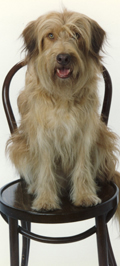|
Dog-dog and dog-human aggression is usually fear-based. Early (very early) super-socialization and ongoing classical conditioning usually prevent these fears from developing.
However, many owners slack off from their pup’s intensive socialization program because two-, three- and four-month-old puppies appear to be super-friendly social butterflies. Unfortunately the effects of insufficient early socialization do not become apparent until later in life. Development follows a natural course; fears and phobias do not usually begin to develop until a dog is five to eight months old.
Whereas treatment protocols are virtually identical to prevention protocols, they are more complicated, take much (MUCH) longer and sometimes, are not without danger
Unfortunately, the rehabilitation of fearful and/or aggressive dogs is often constrained because:
1. Punishment usually exacerbates the problems and
2. Most traditional classical conditioning routines take forever.
Recently though, new techniques have been developed to accelerate and maximize classical conditioning, progressive desensitization and ultimately, re-socialization.
- Differential classical conditioning (DCC) prevents unintentional reinforcement of reactivity when classically conditioning the dog.
- Troubleshooting scenarios to accelerate classical conditioning (rather than attempting to resolve the problems in the course of everyday life)
- Empowering low-level primary reinforcers as the highest-value mega-secondary to maximize classical conditioning.
- Early Socialization with other dogs at 12 weeks of age (earlier if a singleton)
- Puppy Play for Dogs to teach each other Bite Inhibition
- Immediately Resolving Bullying and Fearfulness of Other Puppies/Dogs
- Variable-Age Socialization Groups to maintain Confidence and Social Savvy throughout adolesence
- Ongoing Classical Conditioning throughout adolescent (even though the dog appears to be friendly and confident)
- One-on-One Classical Conditioning Set-Ups to accelerate the process
- Come-Sit-Watch+CC to break stares and decrease tension and threatening behavior
- Objectively Assessing Severity of Fighting — based on Fight:Bite Ratio (actual damage done)
- Quantitative Assessment of Prognosis and Time require to Retrain
- Differential Classical Conditioning (DCC) to enable simultaneous Operant and Classical Conditioning
- Empowering Tug Toys as Mega-Secondary Reinforcers
- The Jolly Routine — certainly the most underutilized Classical Conditioning routine
- Growl Classes
|



